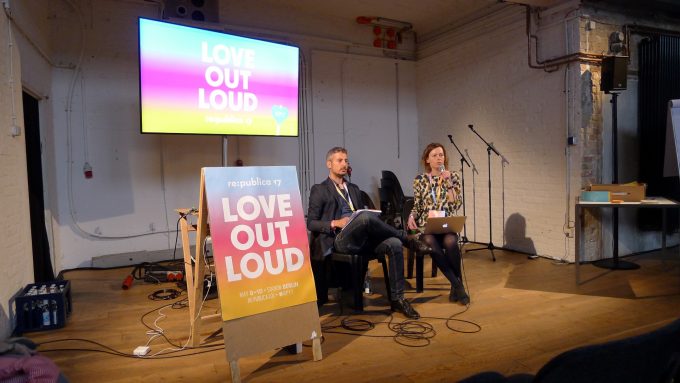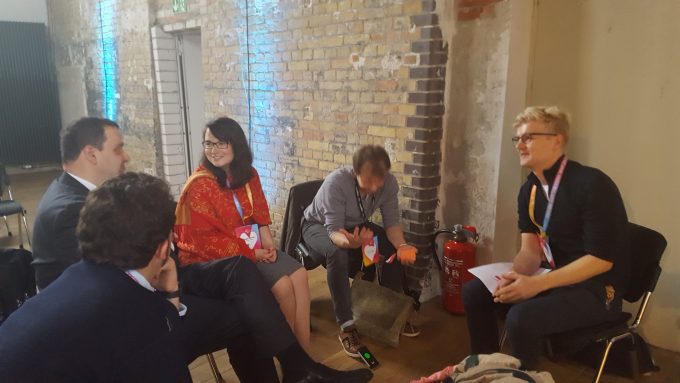Reclaim the net! Copyright and online freedoms at re:publica17
It is hard to count how many times we have been saying that the current European copyright regime is outdated. Sometimes the focus is on the negatives: what it should not be like. The ongoing copyright reform reinforces that tendency with proposals such as the content filter. However, at re:publica17, an annual gathering of media experts, activists and techies , we talked about the positive vision regarding access to culture and freedom of expression.

Diego Naranjo and Anna Mazgal opening the workshop Reclaim the Net! Copyright and online freedoms at re:publica 17 (photo by @austrotrabant)
Our rights need a better law
The joint session of European Digital Rights (EDRi) and Centrum Cyfrowe ‚ÄúReclaim the net! Copyright and online freedoms‚ÄĚ had two goals. First, we wanted to present how culture could be put back in the hands of the people. We provided a positive vision that encompasses greater inclusion of users‚Äô rights. The right to access education ‚Äď and of great quality, as it is possible in Europe ‚Äď encompasses using all sorts of materials, from text, through pictures to music and multimedia, to make the learning interesting and relevant. The right to create and share enables individual artistic expression when a new work is created based on somebody else‚Äôs creation: be it a cat meme, a song cover, or fan fiction. Text and data mining provides for a better understanding of the world, which is key to a better world. Access information of any kind should be possible without anyone limiting it, even in the name of our own benefit.
This vision should be the reality of the digital age. We should be able to use technology to the benefit of an active, educated, creative society. We should be able to make informed choices based on information that is freely accessible. The copyright reform does not give justice to the opportunities that are technologically possible to achieve. We are served licenses instead of exceptions, a censorship machine, and a demonstrated failed proposal to ‚Äútax‚ÄĚ news aggregators.

Workshop participants discussing their „copysins”
Our everyday copysins
During the second part of the workshop, we discussed how the current outdated norms to access to culture (namely copyright laws) lead users to violate copyright, often without knowing they are doing something illegal. They are, in a way, ‚Äúcopysinners‚ÄĚ. The re:publica audience is not free of those ‚Äúsins‚ÄĚ. We discussed how streaming and filesharing or using somebody else‚Äôs picture as a social media avatar are common and sometimes unavoidable, for example because of the unavailability of legal content. Under the current law, these actions are at best legally doubtful if not evidently illegal. Yet they happen all the time.
The participants agreed that a new, modern copyright adapted to the digital age is needed. There is no need for absurd new rights for publishers. Legal use of works such as preparing movie subtitles should be allowed, and geoblocking forbidden. It should be made clear that the use of user-generated content is legal, and the right to private copy should be guaranteed.
Now, with the copyright reform discussed in the European Parliament, the time is ripe to check if policy-making can be based on common sense. These are the things any of us can do:
Take action
- savethememe.net Рtell a MEP you say no to the censorship machine
- rightcopyright.eu Рhelp keep copyright out of the classroom, sign the petition until May 31st
- savethelink.org Рmake sure all the links run free on the web
General information
- Centrum Cyfrowe: reforma prawa autorskiego w Unii Europejskiej – nasze dziaŇāania
- Copyright reform – Guide for the perplexed (Communia – EDRi)
- Centrum Cyfrowe: reforma prawa autorskiego – Przewodnik dla zagubionych
- COMMUNIA policy recommendations
- EDRi: Document pool for the copyright directive proposal
- EDRi’s position on copyright
Post prepared by Anna Mazgal of Centrum Cyfrowe and Diego Naranjo of European Digital Rights who facilitated the workshop